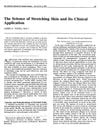 3 citations,
March 2012 in “Hair transplant forum international”
3 citations,
March 2012 in “Hair transplant forum international” Hair restoration surgery can be safely done without major bleeding in patients on antithrombotic therapy, and these drugs shouldn't be stopped before surgery.
 2 citations,
September 2021 in “Orphanet Journal of Rare Diseases”
2 citations,
September 2021 in “Orphanet Journal of Rare Diseases” People with hypohidrotic ectodermal dysplasia are more likely to experience long-term fatigue and hair loss after COVID-19.
 2 citations,
October 2017 in “Drug safety - case reports”
2 citations,
October 2017 in “Drug safety - case reports” Finasteride for hair loss may cause painless bleeding in urine and semen.
 October 2024 in “Skin Research and Technology”
October 2024 in “Skin Research and Technology” Extracorporeal shock waves significantly improve hair growth in women with female pattern hair loss.
February 2024 in “Medicina” AFM can diagnose hair disorders by revealing detailed hair surface changes.
 April 2023 in “Research Square (Research Square)”
April 2023 in “Research Square (Research Square)” Many healthcare workers who had Covid-19 suffer from long-term symptoms like hair loss and fatigue, especially women.
 January 2023 in “International journal of homoeopathic sciences”
January 2023 in “International journal of homoeopathic sciences” The document says homoeopathic treatments are good for hair regrowth in alopecia areata but doesn't give proof.
 January 2023 in “Postępy Dermatologii i Alergologii”
January 2023 in “Postępy Dermatologii i Alergologii” Stem cells can improve wound healing, reduce scars, promote hair growth, rejuvenate skin, and enhance fat grafts in plastic surgery, but there are still some concerns.
 September 2022 in “Polish Hyperbaric Research”
September 2022 in “Polish Hyperbaric Research” Some treatments for hair loss, like finasteride, biotin, and minoxidil, can be effective, but their success varies by individual case.
June 2021 in “International journal of cosmetics and dermatology” Vitamin C and E may help with certain skin and hair conditions, but more research is needed to confirm their effectiveness.
 April 2021 in “Sohag Medical Journal”
April 2021 in “Sohag Medical Journal” Alopecia areata is an autoimmune condition causing hair loss, linked to genetic factors and immune system issues, with no cure yet.
 January 2021 in “Acta Scientiae Veterinariae”
January 2021 in “Acta Scientiae Veterinariae” Levothyroxine effectively treated a dog's skin and hair problems caused by hypothyroidism.
 October 2015 in “Elsevier eBooks”
October 2015 in “Elsevier eBooks” Minoxidil is effective for hair growth and safe for long-term use.
 June 1997 in “The American Journal of Cosmetic Surgery”
June 1997 in “The American Journal of Cosmetic Surgery” Gradual improvements in hair restoration techniques are safer and more effective than drastic changes.
 June 1997 in “The American Journal of Cosmetic Surgery”
June 1997 in “The American Journal of Cosmetic Surgery” Understanding the science of skin stretching is crucial for safe and effective hair replacement techniques.
 July 1975 in “Archives of Dermatology”
July 1975 in “Archives of Dermatology” The document suggests a possible connection between rapid weight loss and hair loss, and reports a case of skin condition improvement after stopping acne medication.
 February 2023 in “Journal of Advanced Research”
February 2023 in “Journal of Advanced Research” A new method using Platelet-rich Plasma (PRP) in a microneedle can promote hair regrowth more efficiently and is painless, minimally invasive, and affordable.
 June 2019 in “Brain Imaging and Behavior”
June 2019 in “Brain Imaging and Behavior” Hair loss can indicate brain aging and potential small vessel disease, but more research is needed to understand the clinical impact.
 July 2008 in “British Journal of Dermatology”
July 2008 in “British Journal of Dermatology” Cyclosporin doesn't stop hair loss.
114 citations,
March 2010 in “Zebrafish” PROTO1 and PROTO2 protect against hearing damage.
 42 citations,
June 2012 in “Clinical and Experimental Dermatology”
42 citations,
June 2012 in “Clinical and Experimental Dermatology” Black dots under trichoscopy can appear in different hair and scalp conditions, not just in alopecia areata.
 37 citations,
September 2018 in “Journal of the American Academy of Dermatology”
37 citations,
September 2018 in “Journal of the American Academy of Dermatology” Ruxolitinib can help regrow hair in severe alopecia areata.
 37 citations,
December 2007 in “International journal of clinical practice”
37 citations,
December 2007 in “International journal of clinical practice” Hirsutism is excessive male-pattern hair growth in women, often caused by hormonal imbalances, and requires ongoing treatment to manage.
 29 citations,
February 2017 in “International Journal of Women's Dermatology”
29 citations,
February 2017 in “International Journal of Women's Dermatology” Women with excessive male-pattern hair growth should get a full hormone check-up to find and treat any underlying issues, considering both medical and emotional aspects.
29 citations,
March 2014 in “PloS one” Astragaloside IV may help prevent hair loss by blocking a specific pathway that leads to cell death.
 8 citations,
January 2003 in “Pharmacotherapy: The Journal of Human Pharmacology and Drug Therapy”
8 citations,
January 2003 in “Pharmacotherapy: The Journal of Human Pharmacology and Drug Therapy” Chemotherapy may cause recurring hair loss due to an autoimmune response.
 7 citations,
January 2014 in “Case reports in endocrinology”
7 citations,
January 2014 in “Case reports in endocrinology” A woman's excessive hair growth was caused by a rare benign tumor in her adrenal gland, which was successfully removed.
 7 citations,
January 2011 in “Veterinary Pathology”
7 citations,
January 2011 in “Veterinary Pathology” A horse with severe hair loss was diagnosed with alopecia areata and a yeast infection.
 April 2017 in “Journal of evolution of medical and dental sciences”
April 2017 in “Journal of evolution of medical and dental sciences” Most women with excess hair growth had Polycystic Ovary Syndrome, and severity wasn't linked to hormone levels.

Women with androgenetic alopecia (hair loss) have normal prostate specific antigen levels but higher testosterone levels.

























